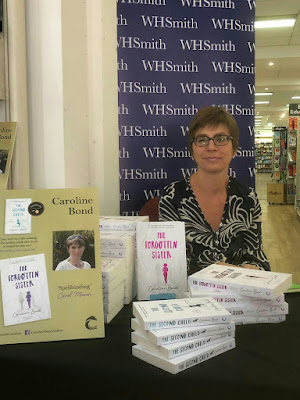In conversation with... Caroline Bond (#2)
Hi Caroline! First of all, I would like to congratulate you
on the publication of The Forgotten Sister! Before we delve deeper into it, I would
like to ask you if you were happy with the reception of your debut novel, The
Second Child, which I have very fond memories of.
A: I was happy, yes, but as a debut writer I didn’t really know what to expect. The best part of the experience - to date - had been readers getting in touch with their responses to the book, some of which have been quite personal. People rooted for different characters in the book and want very different outcomes for them, which I take as a positive sign of engagement. This sort of feedback helped me to more fully grasp that endings are controversial in dilemma fiction - again in a good way. The worst response a book can have is indifference.
Being selected for the Radio Two Book Club was also real boost to my confidence, and to sales. Though being interviewed live by Simon May as my first ever taste of ‘the author lifestyle’ was quite intimidating! I had to go for three nervous wees, before heading into the studio!
There have also been some quite funny moments, including a message from a lady who complained, at length, about the ‘well-fingered pages’ - a yucky thought - of a second hand copy of The Second Child, bought on Amazon, but who made no comment whatsoever about the story, and being ‘recognised’ in my local swimming pool while doing lengths of badly executed breast stroke.
The Forgotten Sister is your second novel. How, if at all, was the writing or publishing process different in comparison to your debut novel?
A: I had the reassurance to know I had a publisher lined up and that made me ‘a writer’, not someone ‘trying to write’. However, because I understood the editorial process better it put more pressure on me to get it right at the fourth or fifth pass. [Please note I’m wise enough now to realise that good books go through many, many stages and drafts to ‘get good.’] Having a big enough idea wasn’t the problem, it was getting the plotting and pacing right. I hope my second book is a little tighter in terms if its dynamics while still making the characters seem real.
I also did more research for The Forgotten Sister. I was lucky enough to interview a couple at length who had very recently adopted a child and I did a lot of reading and watched lots of of testimonials by people who had been ‘brought’ up in our overstretched and neglected care system. I have in the past worked in the juvenile criminal system as a researcher so the new groundwork added to me existing knowledge and thoughts on the crucial impact that the early years of everyone’s lives.
I felt that location was an important element in this novel as it added to the character development. How conscious or subconscious was this choice?
A: I'm still not sure that location is ‘my thing’ but in The Forgotten Sister homes and neighbourhoods are. Again I environments impact greatly on our our prospects for happiness and development.
Without giving too much away, can you tell us about a scene in the book that you love or that was particularly difficult to write?
A: Can I be awkward and tie that question more to a character who started to gain a life of his own and a relevance that was surprising. That is Ryan; a young man whose behaviour is questionable, but whose motivations are revealed to be sound. I quite like characters who say little, or who say the wrong thing, but do the right thing. The scene where Cassie’s dad spies on the young couple, full of prejudice about Ryan’s intentions, only to be wrong footed and shamed by his gentleness, is one of my favourites.
Is there anything that didn’t make it into the final version of the book?
A: Less than with The Second Child, but there were more scenes focusing on the adoption process that had to go.
When it comes to the choice of cover art and title, how involved are you?
A: Very little. My publisher Corvus wanted me to have a recognisable brand, hence the dappled white, the silhouettes and the foil. Recognition is key, especially online and in crowded book shops.
If you are already working on your next writing project, would you mind giving us a little anticipation of what we are to expect?
A: A story about a car accident. The impact on five friends. It’s about revenge, love, and, my all time favourite quality, human resilience. There is, for the first time, a love story in the mix as well.
What are you reading at the moment?
A: Daisy Jones and The Six by Taylor Jenkins Reid. Loving it. Especially the way it is written. I like its verve and the evocation of life in a band.
Thank you for your time!
A: I was happy, yes, but as a debut writer I didn’t really know what to expect. The best part of the experience - to date - had been readers getting in touch with their responses to the book, some of which have been quite personal. People rooted for different characters in the book and want very different outcomes for them, which I take as a positive sign of engagement. This sort of feedback helped me to more fully grasp that endings are controversial in dilemma fiction - again in a good way. The worst response a book can have is indifference.
Being selected for the Radio Two Book Club was also real boost to my confidence, and to sales. Though being interviewed live by Simon May as my first ever taste of ‘the author lifestyle’ was quite intimidating! I had to go for three nervous wees, before heading into the studio!
There have also been some quite funny moments, including a message from a lady who complained, at length, about the ‘well-fingered pages’ - a yucky thought - of a second hand copy of The Second Child, bought on Amazon, but who made no comment whatsoever about the story, and being ‘recognised’ in my local swimming pool while doing lengths of badly executed breast stroke.
The Forgotten Sister is your second novel. How, if at all, was the writing or publishing process different in comparison to your debut novel?
A: I had the reassurance to know I had a publisher lined up and that made me ‘a writer’, not someone ‘trying to write’. However, because I understood the editorial process better it put more pressure on me to get it right at the fourth or fifth pass. [Please note I’m wise enough now to realise that good books go through many, many stages and drafts to ‘get good.’] Having a big enough idea wasn’t the problem, it was getting the plotting and pacing right. I hope my second book is a little tighter in terms if its dynamics while still making the characters seem real.
I also did more research for The Forgotten Sister. I was lucky enough to interview a couple at length who had very recently adopted a child and I did a lot of reading and watched lots of of testimonials by people who had been ‘brought’ up in our overstretched and neglected care system. I have in the past worked in the juvenile criminal system as a researcher so the new groundwork added to me existing knowledge and thoughts on the crucial impact that the early years of everyone’s lives.
I felt that location was an important element in this novel as it added to the character development. How conscious or subconscious was this choice?
A: I'm still not sure that location is ‘my thing’ but in The Forgotten Sister homes and neighbourhoods are. Again I environments impact greatly on our our prospects for happiness and development.
Without giving too much away, can you tell us about a scene in the book that you love or that was particularly difficult to write?
A: Can I be awkward and tie that question more to a character who started to gain a life of his own and a relevance that was surprising. That is Ryan; a young man whose behaviour is questionable, but whose motivations are revealed to be sound. I quite like characters who say little, or who say the wrong thing, but do the right thing. The scene where Cassie’s dad spies on the young couple, full of prejudice about Ryan’s intentions, only to be wrong footed and shamed by his gentleness, is one of my favourites.
Is there anything that didn’t make it into the final version of the book?
A: Less than with The Second Child, but there were more scenes focusing on the adoption process that had to go.
When it comes to the choice of cover art and title, how involved are you?
A: Very little. My publisher Corvus wanted me to have a recognisable brand, hence the dappled white, the silhouettes and the foil. Recognition is key, especially online and in crowded book shops.
If you are already working on your next writing project, would you mind giving us a little anticipation of what we are to expect?
A: A story about a car accident. The impact on five friends. It’s about revenge, love, and, my all time favourite quality, human resilience. There is, for the first time, a love story in the mix as well.
What are you reading at the moment?
A: Daisy Jones and The Six by Taylor Jenkins Reid. Loving it. Especially the way it is written. I like its verve and the evocation of life in a band.
Thank you for your time!




Comments
Post a Comment